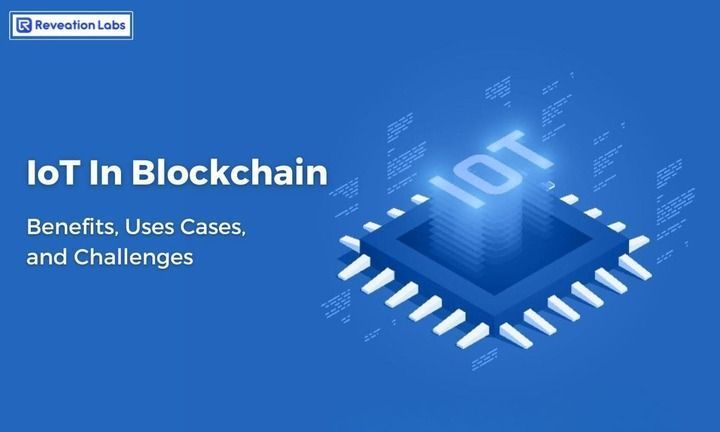
Jhansi Pothuru
16 Aug 2023
In the world of technological progress, two remarkable inventions have been causing a stir: blockchain and the Internet of Things (IoT). While these advances have each changed industries on their own, combining them holds the potential to completely transform how data is handled, security is ensured, and automation is applied across different fields.
Blockchain, often linked with cryptocurrencies, is a special kind of technology that keeps records in a very secure and organized way. Think of it as a digital book that many computers share. Each new piece of information is connected to the one before it, making a chain that can't be changed, which is why it's called "blockchain."
The great thing about blockchain is that it can help solve big problems by making sure data is real and safe. Because of how it works, everyone can see what's happening, and no one can secretly change the information. This builds trust and something is written down, everyone has to agree before it can be changed or taken away. This helps make data from things like smart devices more reliable.
The Internet of Things (IoT) is like a big web of connected devices. These devices have parts like sensors and software that help them gather and share information. Think of things like smart thermostats that control your home's temperature, wearable health gadgets, or even big machines in factories. These things are all part of IOT, and they make our world super connected. But, using lots of IoT stuff also brings some problems. One big problem is making sure all the information stays safe and private.
The devices make a ton of information, and this information moves around through networks. A few might try to take that information or change it. This is where blockchain technology comes in. It's like a super tool that helps to keep everything safe and hard to change.
Combining the Internet of Things IoT with blockchain means bringing these two technologies together. This helps make a stronger, clear, and better system for handling data and value between connected devices.
Also Read: How blockchain and AI transforming Industries
The possibilities of merging blockchain and IoT are vast. They can benefit many industries by boosting data reliability, security, and automation.
The supply chain industry is characterized by intricate networks involving multiple stakeholders, from manufacturers to distributors and retailers.
Blockchain-IoT integration can introduce a new era of transparency by enabling real-time tracking of goods, recording their journey from origin to destination. Smart sensors can monitor conditions such as temperature and humidity, ensuring the quality and authenticity of products. In case of any inconsistency or deviations from set parameters, the blockchain can trigger alerts and actions, preventing potential losses.
In the healthcare sector, the combination of blockchain and IoT can revolutionize patient care. Wearable devices and sensors can collect patient data, which is then securely stored on a blockchain. Patients have full control over who accesses their data, enhancing privacy and consent management.
Moreover, the use of smart contracts can streamline insurance claims processing and automate billing, reducing administrative overhead.
The energy industry can benefit from blockchain-IoT synergy by enabling efficient energy management. IoT-enabled smart meters can collect real-time data on energy consumption, while blockchain ensures the accuracy and security of this data. Smart contracts can facilitate peer-to-peer energy trading, allowing individuals to sell excess energy directly to others, thereby promoting renewable energy adoption and decentralization of power distribution.
Blockchain and IoT integration can revolutionize food safety within the agricultural sector by ensuring the traceability of products throughout the supply chain. This innovative approach utilizes sensors to monitor crucial factors like soil conditions and temperature, while the implementation of blockchain technology diligently records each step of production and distribution. In the event of a foodborne illness outbreak, the utilization of blockchain in agriculture enables rapid identification of the contamination source, thus effectively minimizing the impact on public health.
In the context of smart cities, the convergence of blockchain and IoT can lead to more efficient and sustainable urban development. IoT devices can gather data on traffic flow, waste management, and energy consumption, which can be securely stored on a blockchain. This data can then be used to optimize city planning, reduce congestion, and enhance resource allocation.
While the potential of integrating blockchain with IoT is immense, several challenges must be addressed. Scalability, energy consumption, interoperability, and costs are among the key considerations for implementing these technologies
Integrating IoT with blockchain offers exciting possibilities, but it also presents a set of challenges that need to be carefully considered and addressed to create successful and impactful solutions. Collaboration with the blockchain experts and IoT experts as well as ongoing research and development, will play a crucial role in overcoming these challenges and realizing the full potential of this integration.
Combining blockchain and IoT is like a big change that can make industries better and change how we use technology. When we connect these two things, it helps make sure data is correct, keeps things safe, and lets things happen automatically. This teamwork can make lots of new things possible for businesses and people, helping them handle the modern digital world with certainty. As time goes on, these technologies will get even better at working together, making each other stronger. This will help us move toward a future full of new ideas and the ability to bounce back from challenges.


Jhansi Pothuru
Tue Oct 3 2023

Divya Nautiyal
Mon Oct 2 2023

Jhansi Pothuru
Fri Sep 29 2023

Jhansi Pothuru
Fri Sep 22 2023
Partner with Reveation Labs today and let’s turn your business goals into tangible success. Get in touch with us to discover how we can help you.